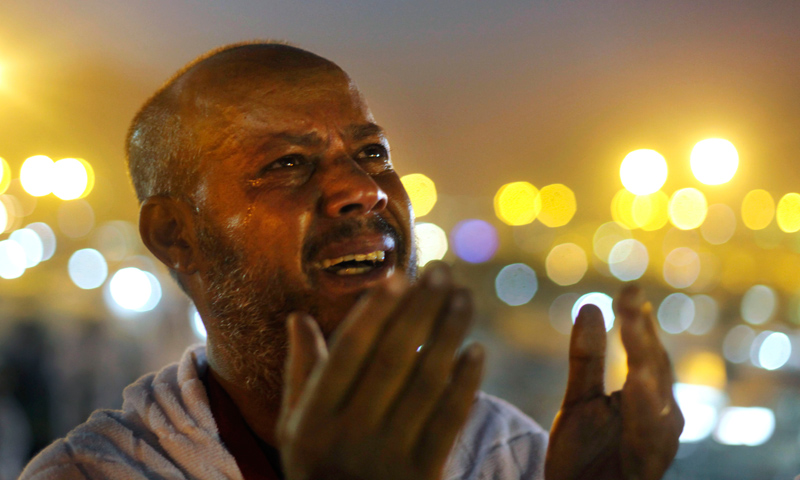Islam strictly forbids terrorism, says Grand Mufti in Hajj sermon




MOUNT ARAFAT: Saudi Arabia’s top religious figure urged Muslims on Monday to avoid divisions, chaos and sectarianism, without explicitly speaking of the turmoil unleashed by the Arab Spring.
Hell is the final abode for those who spill the blood of an innocent human, said Sheikh Abdulaziz al-Sheikh, the Grand Mufti of the Ka'aba.
“Islam does not allow terrorism at any cost. Islam condemns all violence and terrorism plaguing the world today. Muslims should demonstrate a love for peace and unity,” he said.
The Grand Mufti recalled the Islamic prohibition of killing and aggression, while insisting there is “no salvation or happiness for the Muslim nation without adhering to the teachings of the religion.”
The top cleric also urged Muslims to avoid divisions, chaos and sectarianism.
“Your nation is a trust with you. You must safeguard its security, stability and resources,” he said in his address to the Muslim world. “You should know that you are targeted by your enemy... who wants to spread chaos among you ... It's time to confront this.”
Officials said around 1.5 million pilgrims descended on the site, where they offered prayers and listen to the annual sermon from the Saudi top cleric.
Helicopters hovered overhead and thousands of troops stood guard to organise roads flooded by men, women and children streaming towards Mount Arafat.
The top cleric said Muslims throughout the world were going through a difficult time, and stressed that the global economic crisis could be controlled if the Islamic economic system was adopted. “Muslims should support the community by investing in their businesses,” he urged.
Chanting “Labaik Allahuma Labaik” (I am responding to your call, God), many of them camped in small colourful tents and took shelter under trees to escape temperatures of around 40 degrees Celsius (104 Fahrenheit). Special sprinklers were also helping cool the pilgrims.
The pilgrims were arriving at Arafat from nearby Mina where most of them spent the night following the traditions of the Holy Prophet Mohammed (PBUH) who performed the rituals 14 centuries ago.
They had moved to Mina on Sunday from the holy city of Mecca, home to the Grand Mosque, Islam’s holiest place of worship which houses the Ka’aba towards which all Muslims pray daily five times.
On reaching Arafat, they crowded onto the hill and the vast plain surrounding it to pray until sunset, when they are due to set off for nearby Muzdalifah.
“I will pray the whole day for God to improve the situation for Muslims worldwide and an end to disputes and bloodshed in Arab countries,” 61-year-old Algerian pensioner Saeed Dherari said.
Sitting at the side of an Arafat road, Syrian Ahmad al-Khader prayed for oppressed Syrians to be victorious. “I hope that God will grace all Muslims with security and stability,” said 75-year-old Khader who hails from the southern province of Daraa.
“The regime is tyrannical and I pray for God to help the oppressed people,” he said.
Egyptian Ahmad Ali, who performed Haj for the first time, prayed for peace in his country, where hundreds were killed in recent months in fighting between security forces and Islamist supporters of ousted president Mohamed Morsi.
In Muzdalifa, pilgrims will spend the night before moving on in the morning to start the ritual of symbolically stoning the devil.
The hajj, which officially ends on Friday, is one of the five pillars of Islam that every capable Muslim must perform at least once.
Numbers sharply down
Numbers are sharply down from last year, due to fears linked to the (Middle East Respiratory Syndrome) MERS virus and to multi-billion-dollar expansion work at the Grand Mosque to almost double its capacity to around 2.2 million worshippers.
Governor of Mecca province and head of the central hajj committee Prince Khaled al-Faisal said 1.38 million pilgrims had arrived from outside of the kingdom while only 117,000 hajj permits were issued for domestic pilgrims.
This puts the number of pilgrims this year at almost 1.5 million, less than half of last year’s 3.2 million after Riyadh slashed hajj quotas.
Prince Khaled told the official SPA news agency late Sunday that authorities had turned back 70,000 nationals and expatriates for not carrying legal permits and had arrested 38,000 others for performing the hajj without a permit.
Authorities had also seized as many as 138,000 vehicles for violating the hajj rules and its owners will be penalised, the prince said.
Saudi health authorities have stressed that no cases of the Middle East Respiratory Syndrome (MERS) virus has been detected so far this pilgrimage. The disease has killed 60 people worldwide, 51 of them in Saudi Arabia itself.














































